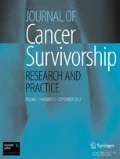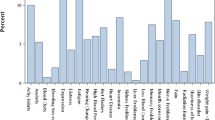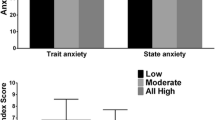Abstract
Introduction
Relatively few studies of breast cancer survivors have included nonwhite women or women who do not speak English.
Methods
We administered a survey to patients who were ≥3 months post-completion of their adjuvant treatment for stage 0-III breast cancer at Columbia University Medical Center in order to assess the prevalence of 16 physical and emotional symptoms and identify sociodemographic factors associated with these symptoms. Univariate analysis, factor analysis, ANOVA, and multiple linear regression analysis were performed.
Results
Of 139 patients surveyed, 58 were white, 63 Hispanic, and 18 black. The symptom most commonly reported was fatigue(76%), and the most common severe symptom was muscle aches(40%). Most patients(70%) complained of ≥6 symptoms. Hispanic women were more likely to report >10 symptoms (p < 0.05). Factor analysis reduced the 16 symptoms to 4 underlying symptom clusters that we categorized as ‘depression’, ‘chemotherapy’, ‘hormone’, and ‘pain’-related. In the multiple linear regression models, Hispanic women were more likely to report chemotherapy-related symptoms (p < 0.05) and pain-related symptoms (p < 0.05). Unemployed women were more likely to report chemotherapy-related symptoms (p < 0.05). Women <45 years old were less likely to report chemotherapy (p < 0.05) and pain-related symptoms (p < 0.05).
Conclusions
The majority of women in this study, particularly those who were Hispanic, elderly, or unemployed, experienced persistent symptoms, most commonly fatigue and muscle aches.
Implications for cancer survivors
Because Hispanic, elderly, or unemployed women experience greater symptom burden, efforts should made to address their unique needs.


Similar content being viewed by others
References
American Cancer Society. Cancer Reference Information. Available at: http://www.cancer.org/docroot/CRI/content/CRI_2_2_1X_How_many_people_get_breast_cancer_5.asp; 2009.
Smith K, Avis NE, Assmann SF. Distinguishing between quality of life and health status in quality of life research: a meta-analysis. Qual Life Res. 1999;8:447–59.
Ganz PA, Rowland J, Meyerowitz B. Impact of different adjuvant therapy strategies on quality of life in breast cancer survivors. Recent Results Cancer Res. 1998;152:396–411.
Lindley C, Vasa S, Sawyer WT, Winer EP. Quality of life and preferences for treatment following systemic adjuvant therapy for early-stage breast cancer. J Clin Oncol. 1998;16:1380–7.
Dorval M, Maunsell E, Deschenes L, Brisson J, Masse B. Long-term quality of life after breast cancer: comparison of 8-year survivors with population controls. J Clin Oncol. 1998;16:487–94.
Schroevers M, Ranchor AV, Sanderman R. Adjustment to cancer in the 8 years following diagnosis: A longitudinal study comparing cancer survivors with healthy individuals. Soc Sci Med. 2006;63:598–610.
Helgeson V, Tomich P. Surviving cancer: a comparison of 5-year disease-free breast cancer survivors with healthy women. Psychooncology. 2005;14:307–17.
van der Steeg A, De Vries J, Roukema J. The value of quality of life and health status measurements in the evaluation of the well-being of breast cancer survivors. Eur J Surg Oncol. 2008;34:1225–30.
Ganz P, Rowland JH, Desmond K, Meyerowitz B, Wyatt GE. Life after breast cancer: understanding women’s health-related quality of life and sexual functioning. J Clin Oncol. 1998;16:501–14.
de Haes J, Curran D, Aaronson N. Quality of life in breast cancer patients aged over 70 years, participating in the EORTC 10850 randomised clinical trial. Eur J Cancer. 2003;39:945–51.
Lash T, Silliman R. Patient characteristics and treatments associated with a decline in upper-body function following breast cancer therapy. J Clin Epidemiol. 2000;53:615.
Deutsch M, Flickinger J. Shoulder and arm problems after radiotherapy for primary breast cancer. Am J Clin Oncol. 2001;24:172–6.
Knobf M, Sun Y. A longitudinal study of symptoms and self-care activities in women treated with primary radiotherapy for breast cancer. Cancer Nurs. 2005;28:210–8.
Love R, Cameron L, Connell B, Leventhal H. Symptoms associated with tamoxifen treatment in postmenopausal women. Arch Int Med. 1991;151:1842–7.
Sadler IJ, Jacobsen P. Progress in understanding fatigue associated with breast cancer treatment. Cancer Invest. 2001;19:723.
Wood WC, Budman DR, Korzun A, Cooper RM, Younger J, Hart RD, et al. Dose and dose intensity of adjuvant chemotherapy for stage II, node-positive breast carcinoma. N Engl J Med. 1994;330:1253.
Bromberger JT, Meyer PM, Kravitz H. Psychologic distress and natural menopause: a multiethnic community study. Am J Public Health. 2001;91:1435–42.
Ganz PA, Greendale GA, Petersen L, Kahn B, Bower JE. Breast cancer in younger women: reproductive and late health effects of treatment. J Clin Oncol. 2003;21:4184–93.
Kurtz M, Kurt J, Stommel M, Given CW, Given B. The influence of symptoms, age, comorbidity, and cancer site on physical functioning and mental health of geriatric women patients. Women Health. 1999;29:1–12.
Stanton AL, Bernaards C, Ganz P. The BCPT symptom scales: a measure of physical symptoms for women diagnosed with or at risk for breast cancer. J Natl Cancer Inst. 2005;97:448–56.
Bernstein R. U.S. Hispanic Population Surpasses 45 Million Now 15 Percent of Total (CB08-67). U.S. Census Bureau Press Releases; 2008.
Bergman M. Census projects tripling of Hispanic and Asian populations in 50 Years; Non-Hispanic whites may drop to half of total population (CB08-67). U.S. Census Bureau Press Releases; 2004.
Jemal A, Clegg LX, Ward E, Ries LA, Wu X, Jamison PM, et al. Annual report to the nation on the status of cancer, 1975–2001, with a special feature regarding survival. Cancer. 2004;101:3–27.
Elledge RM, Clark GM, Chamness GC, Osborne CK. Tumor biologic factors and breast cancer prognosis among white, Hispanic, and black women in the United States. J Natl Cancer Inst. 1994;86:705–12.
Biffl WL, Myers A, Franciose RJ, Gonzalez RJ, Darnell D. Is breast cancer in young Latinas a different disease? Am J Surg. 2001;182:596–600.
Daly MB, Clark GM, McGuire WL. Breast cancer prognosis in a mixed Caucasian-Hispanic population. J Natl Cancer Inst. 1985;74:753–7.
Frost F, Tollestrup K, Hunt WC, Gilliland F, Key CR, Urbina CE. Breast cancer survival among New Mexico Hispanic, American Indian, and non-Hispanic white women (1973–1992). Cancer Epidemiol Biomarkers Prev. 1996;5:861–6.
Yoon J, Malin JL, Tao ML, Tisnado DM, Adams JL, Timmer MJ, et al. Symptom management after breast cancer treatment: is it influenced by patient characteristics? Breast Cancer Res Treat. 2008;108:69–77.
Bergard L. Washington heights/inwood demographic, economic, and social transformations 1990–2005 with a special focus on the Dominican population. Center for Latin America, Caribbean, and Latino Studies; 2008.
Chang V, Hwang SS, Feuerman M, Kasimis BS, Howard H. The memorial symptom assessment scale short form (MSAS-SF) validity and reliability. Cancer. 2000;89:1162–71.
Johnson R, Wichern D. Applied multivariate statistical analysis. 4th ed. New Jersey: Prentice-Hall; 1998.
Stein KD, Syrjala KL, MA A. Physical and psychological long-term and late effects of cancer. Cancer. 2008;112:2577–92.
Portenoy RK, Thaler HT, Kornblith AB, McCarthy Lepore J, Friedlander-Klar H, Coyle N, et al. Symptom prevalence, characteristics, and distress in a cancer population. Qual Life Res. 1994;3:183–9.
Chang VT, Hwang SS, Feuerman M, Kasimis B. Symptom and quality of life survey of medical oncology patients at a Veterans Affairs medical center. Cancer. 2000;88:1175–83.
Wilson H, Robinson JP, Turk D. Toward the identification of symptom patterns in people with fibromyalgia. Arthritis Rheum. 2009;61:527–34.
Becker A, Thomas JJ, Bainivualiku A, Richards L, Navara K, Roberts AL, et al. Validity and reliability of a Fijian translation and adaptation of the Eating Disorder Examination Questionnaire. Int J Eat Disord; 2009:[Epub ahead of print].
Sharpley C, Christie D. ‘How I was then and how I am now’: current and retrospective self-reports of anxiety and depression in Australian women with breast cancer. Psychooncology. 2007;16:752–62.
Eversley R, Estrin D, Dibble S, Wardlaw L, Pedrosa M, Favila-Penney W. Post-treatment symptoms among ethnic minority breast cancer survivors. Oncol Nurs Forum. 2005;32:250–6.
Bowen DJ, Alfano CM, McGregor BA, Kuniyuki A, Bernstein L, Meeske K, et al. Possible socioeconomic and ethnic disparities in quality of life in a cohort of breast cancer survivors. Breast Cancer Res Treat. 2007;106:85–95.
Pagano IS, Gotay CC. Ethnic differential item functioning in the assessment of quality of life in cancer patients. Health Qual Life Outcomes. 2005;3:60.
Gotay CC, Holup JL, Pagano I. Ethnic differences in quality of life among early breast and prostate cancer survivors. Psychooncology. 2002;11:103–13.
Ashing-Giwa K, Ganz PA, Petersen L. Quality of life of African–Americans and white long term breast carcinoma survivors. Cancer. 1999;85:418–26. [Erratum, Cancer 486:732-733].
Chowdhury PP, Balluz L, Strine TW. Health-related quality of life among minority populations in the United States, BRFSS 2001–2002. Ethn Dis. 2008;18:483–7.
Spencer SM, Lehman JM, Wynings C, Arena P, Carver CS, Antoni MH, et al. Concerns about breast cancer and relations to psychosocial well-being in a multiethnic sample of early-stage patients. Health Psychol. 1999;18:159–68.
Yoon J, Malin JL, Tao ML, Tisnado DM, Adams JL, Timmer MJ, et al. Symptoms after breast cancer treatment: are they influenced by patient characteristics? Breast Cancer Res Treat. 2008;108:153–65.
Green CR, Montague L, Hart-Johnson TA. Consistent and breakthrough pain in diverse advanced cancer patients: a longitudinal examination. J Pain Symptom Manage. 2009;2009:831–47.
Cimprich B, Ronis DL, Martinez-Ramos G. Age at diagnosis and quality of life in breast cancer survivors. Cancer Pract. 2002;10:85–93.
Fehlauer F, Tribius S, Mehnert A, Rades D. Health-related quality of life in long term breast cancer survivors treated with breast conserving therapy: impact of age at therapy. Breast Cancer Res Treat. 2005;92:217–22.
Paskett E, Herndon J 2nd, Donohue K, Naughton M, Grubbs S, Pavy M, et al. Health-related quality of life in long-term breast cancer survivors: differences by adjuvant chemotherapy dose in Cancer and Leukemia Group B study 8541. Cancer. 2009;115:1109–20.
Hewitt M, Rowland JH, Yancik R. Cancer survivors in the United States: age, health and disability. J Gerontol Ser A: Biol Sci Med Sci. 2003;58A:82–91.
Sammarco A. Quality of life among older survivors of breast cancer. Cancer Nurs. 2003;26:431–8.
Silliman RA, Dukes KA, Sullivan LM, Kaplan SK. Breast cancer care in older women. Cancer. 1998;83:706–11.
Mahar KK, BrintzenhofeSzoc K, Shields J. The impact of changes in employment status on psychosocial well-being: a study of breast cancer survivors. J Psychosoc Oncol. 2008;26:1–17.
Salonen P, Tarkka MT, Kellokumpu-Lehtinen PL, Astedt-Kurki P, Luukkaala T, Kaunonen M. Telephone intervention and quality of life in patients with breast cancer. Cancer Nurs. 2009;32:177–90.
Chirikos TN, Russell-Jacobs A, Cantor AB. Indirect economic effects of long-term breast cancer survival. Cancer Pract. 2002;10:248–55.
Chirikos TN, Russell-Jacobs A, Jacobsen PB. Functional impairment and the economic consequences of female breast cancer. Women Health. 2002;36:1–20.
Ashing-Giwa K, Lim JW. Examining the impact of socioeconomic status and socioecologic stress on physical and mental health quality of life among breast cancer survivors. Oncol Nurs Forum. 2009;36:79–88.
Avis NE, Assmann SF, Kravitz HM, Ganz PA, Ory M. Quality of life in diverse groups of midlife women: assessing the influence of menopause, health status and psychosocial and demographic factors. Qual Life Res. 2004;13:933–46.
Bui QU, Ostir GV, Kuo YF, Freeman J, Goodwin JS. Relationship of depression to patient satisfaction: findings from the barriers to breast cancer study. Breast Cancer Res Treat. 2005;89:23–8.
Grol R. Improving the quality of medical care: building bridges among professional pride, payer profit, and patient satisfaction. JAMA. 2001;286:2578–85.
Nagy VT, Wolfe GR. Cognitive predictors of compliance in chronic disease patients. Med Care. 1984;22:912–21.
Goodwin JS, Zhang DD, Ostir GV. Effect of depression on diagnosis, treatment, and survival of older women with breast cancer. J Am Geriatr Soc. 2004;52:106–11.
Sammarco A. Perceived social support, uncertainty, and quality of life of younger breast cancer survivors. Cancer Nurs. 2001;24:212–9.
Sammarco A, LM K. Quality of life, social support, and uncertainty among Latina breast cancer survivors. Oncol Nurs Forum. 2008;35:844–9.
Edelman S, Bell DR, Kidman AD. A group cognitive behaviour therapy programme with metastatic breast cancer patients. Psychooncology. 1999;8:292–305.
Goodwin PJ, Leszcz M, Ennis M, Koopmans J, Vincent L, Guther H, et al. The effect of group psychosocial support on survival in metastatic breast cancer. N Engl J Med. 2001;345:1719–26.
Gottlieb BH, Wachala ED. Cancer support groups: a critical review of empirical studies. Psychooncology. 2006;16:379–400.
Rehse B, Pukrop R. Effects of psychosocial interventions on quality of life in adult cancer patients: Meta analysis of 37 published controlled outcome studies. Patient Educ Couns. 2003;50:179–86.
Campbell H, Phaneuf MR, Deane K. Cancer peer support programs-do they work? Patient Educ Couns. 2004;55:3–15.
Cunningham AJ, Edmonds CV. Group psychological therapy for cancer patients: A point of view, and discussion of the hierarchy of options. Int J Psychiatry Med. 1996;26:51–82.
Nápoles-Springer A, Ortíz C, O’Brien H, Díaz-Méndez M, Pérez-Stable E. Use of cancer support groups among Latina breast cancer survivors. J Cancer Surviv. 2007;1:193–204.
Clayton M, Dudley W. Patient-centered communication during oncology follow-up visits for breast cancer survivors: content and temporal structure. Oncol Nurs Forum. 2009;36:E68–79.
Andersen M, Bowen DJ, Morea J, Stein KD, Baker F. Involvement in decision-making and breast cancer survivor quality of life. Health Psychol. 2009;28:29–37.
Higgins SC, Montgomery GH, Bovbjerg DH. Distress before chemotherapy predicts delayed but not acute nausea. Support Care Cancer. 2007;15:171–7.
Montgomery GH, Bovbjerg DH. Expectations of chemotherapy-related nausea: emotional and experiential predictors. Ann Behav Med. 2003;25:48–54.
Sabbioni ME, Bovbjerg DH, Jacobsen PB, Manne SL, Redd WH. Treatment related psychological distress during adjuvant chemotherapy as a conditioned response. Ann Oncol. 1992;3:393–8.
Acknowledgments
Olivia Fu did this work as part of a Doris Duke Clinical Research Fellowship. Dr. Hershman is the recipient of a grant from the Susan Komen Foundation (DISP0706868).
Author information
Authors and Affiliations
Corresponding author
Rights and permissions
About this article
Cite this article
Fu, O.S., Crew, K.D., Jacobson, J.S. et al. Ethnicity and persistent symptom burden in breast cancer survivors. J Cancer Surviv 3, 241–250 (2009). https://doi.org/10.1007/s11764-009-0100-7
Received:
Accepted:
Published:
Issue Date:
DOI: https://doi.org/10.1007/s11764-009-0100-7




